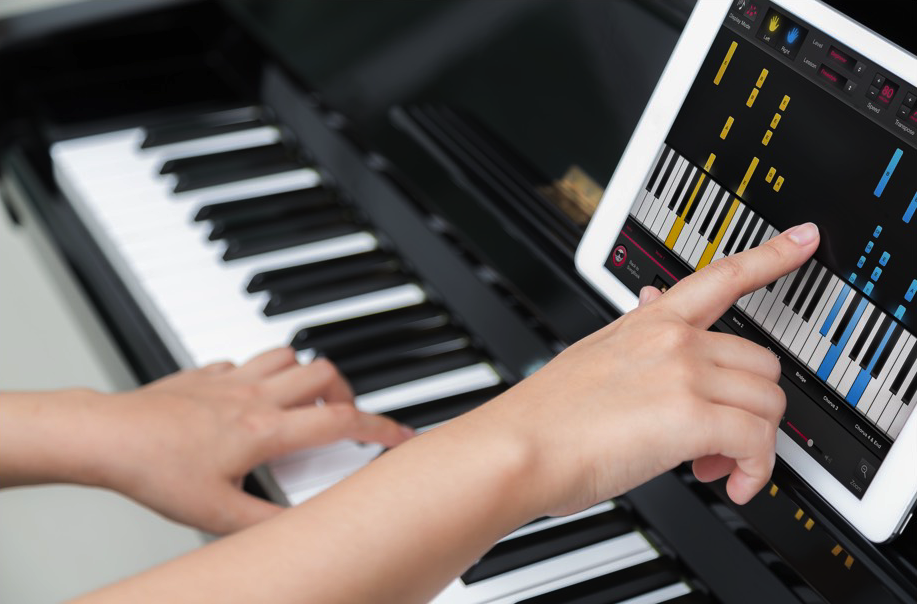When it comes down to it, we all want one thing – benefits. Yes, benefits. We all have that perennial question wondering if our time spent doing something will benefit us today, tomorrow or later in life. There is nothing worse than feeling like you’re spending countless hours of your time doing something which won’t benefit your life. And for many a piano student, in fact any student of music for that matter, this thought surely has crossed each of our minds at some point in time. So behold, OnlinePianist has come to your aid! We’ve put together nine reasons why learning to play piano will benefit your lives, as proven by the most honest of critics – science.
1. Learning An Instrument Accelerates Attention & Organisational Skills.
A few notes can change your life.
According to some scientific studies, training on an instrument has been proven to accelerate cortical organisation in regard to attention skill, anxiety and emotional control. These studies have found learning to play piano increases the thickness in those parts of the brain responsible for executive functioning which covers things like working memory, attentional control and organisation skills as well as organisation and planning for the future. We’re sure we could all use some of that from time to time. Can we get an Amen?
2. Music Training Improves Your Cognitive & Non-Cognitive Skills More Than Sports, Theater or Dance.
The scientific power of music.
Can’t decide between sports, theater, dance or learning music? Well friends, allow science to help you decide. The German Institute for Economic Research clearly concluded that music training improved both “cognitive and non-cognitive skills more than twice as much as sports, theater and dance”. And you can take that all the way to the bank!
3. Taking Music Lessons Improves Brain Plasticity.
Elderly man in a nursing home reacts to hearing music from his era.
What’s more is that the benefits of learning to play an instrument persist long after a child stops taking lessons. Numerous longitudinal studies indicate that taking music lessons as a child increases brain plasticity, and can help men and women – get this – resist the effects to ageing and cognitive decline! Yes, learning to play piano actually keeps you young at heart, or more specifically, young up top. None of that “live fast, die young” nonsense. We say, “learn piano, live long and prosper”, yo.
4. Practicing An Instrument Helps Control Emotions & Reduces Anxiety.
The value of music education.
Do you ever feel stressed? Who doesn’t! Get distracted easily? Huh, come again? Find that your mood swings more than pendulum? Yeah… Well, we have the solution – learn to play piano! (Come on, were you really expecting a different answer? Pshhh.) Scientific studies have shown that music practice helps kids (or adults for that matter!) focus their attention, control their emotions and diminish their anxiety. Kick that caffeine habit today and start getting your hands on this baby.
5. Playing Piano Makes You Utilise Both Sides Of Your Brain Equally.
Benefits of piano lessons.
But the question pops up, “Doesn’t this apply to every instrument?” Yes and no. Think about it: A piano player uses both hands to play simultaneously while traversing 88 keys. The ability to play 10 notes at a time, and looking ahead or thinking ahead of what’s next, combined at times with the foot pedal, gives you an indication of the mental fortitude needed to navigate the complexity of the most remarkable instrument of them all. In turn, pianists are required to develop a unique brain pattern, different to musicians of other instruments with equal skill and reaction in both hands. This makes the piano player the ultimate instrument maestro in terms of skills and imposition. We don’t mean to hate on guitarists or anything, but a pianist in particular needs to overcome something nearly every person is born with, a dominant right or left hand. Science has shown that for the average person, their brain’s central sulcus is either more to the right or to the left side.

This in turn determines which hand is more dominant. However, when scientists scanned the brains of pianists, they noticed something quite striking: Pianists, it seems, had a notably more symmetrical central sulcus than others, even if they were born right or left handed. It was almost as if their brains didn’t register it. This further shows that no matter what despite our natural tendency to be, we are able to strengthen the “weaker” side to be as strong as our dominant side of our mind simply by playing piano. If you are a sportsperson, you will already be considering improving your dexterity. Now, what better way than adding a new skill to the repertoire while you’re going hard at practices! Yeah, we talkin’ ‘bout practice.
6. Playing Improvisational Piano Pieces In Turn Makes You More Creative.
The patterns of rock music are universal.
Put on the spot? Wishing you had the ability to think on your feet? Want to be more spontaneous? Well fear not, because evidence based on research shows that the brain regions involved in creative playing, known in scientific circles as the dorsolateral prefrontal cortex (what a mouthful!), are active when a pianist plays an improvisational piece. This brain region has been linked prior to suppression of stereotypical responses and instead generates more improvised actions. To put it in layman terms, this means playing whatever comes to mind on a piano may in fact help you be creative in other aspects of your life as it triggers the part of our brains which lead to those “Eureka!” moments.
7. Being A Musician Makes You Better At Problem Solving, Learning New Languages & More Sociable.
The transformative power of classical music.
It has also be proven that the improvement in musicians frontal lobes has far reaching benefits to an individual’s overall decision making skills. You get better at problem solving, language, spontaneity, decision making and improves your social behaviour. Basically, a pianist can integrate all of their mind’s information into more efficient thoughts. In essence, a pianist is able to fast track their brain into accessing the required sectors needed to perform any given task. A pianist then becomes something like a superhero with superhuman mind control abilities. Even if it is in their own minds only. Still counts, man.
8. Playing The Piano Increases Manual Dexterity Requiring Less Energy To Do Perform Manual Tasks.
How music affects your brain.
According to one study, “The long-term motor practice in piano players has led to an increase in manual dexterity. Movements that are judged as complex by control subjects therefore have a lesser degree of complexity for piano players. This difference is reflected in the lesser degree of cortical activation.” This basically means that it takes a piano player less energy to concentrate due to the decreased amount of blood flow to the brain, compared with other people when associated with fine motor tasks. This gives a piano player more energy to pursue their extra curricular activities. Whatever that may be. No judgements made here. Ha.
9. Learning The Piano Increases Your IQ By Several Points.
How playing an instrument benefits your brain.
Finally, you might be thinking to yourself, “Man, I just want to be better at everything. If only there was a way I could be better at everything by doing just one thing.” Well, my friend, you have certainly come to the right place then. Learning to play the piano has been proven to increase people’s IQ by seven points! That’s right, seven points. And this has been found in both children as well as adults who learned to play piano. As they say, it’s never too late to start. As mentioned earlier, parts of the brain linked with motor skills, hearing, storing audio information, and memory increase in size and become more active as a person learns to play an instrument.
 More so, it has been shown that day to day actions like being alert, planning, and reading and reacting to other peoples emotions (i.e., empathy) improves when learning to play piano. Furthermore, it makes it easier to learn foreign languages due to improved recognition of tone and improvements in storing audio information. By learning to play the piano, we are able to change the very architecture of our minds, whether we begin while we’re young or when we’re older, simply after a few months of playing for only an hour a week. That’s right, just an hour a week is all it takes. Now if that isn’t mind-blowingly awesome, we just don’t know what is!
More so, it has been shown that day to day actions like being alert, planning, and reading and reacting to other peoples emotions (i.e., empathy) improves when learning to play piano. Furthermore, it makes it easier to learn foreign languages due to improved recognition of tone and improvements in storing audio information. By learning to play the piano, we are able to change the very architecture of our minds, whether we begin while we’re young or when we’re older, simply after a few months of playing for only an hour a week. That’s right, just an hour a week is all it takes. Now if that isn’t mind-blowingly awesome, we just don’t know what is!
So in summary, do yourself a favour – go learn to play the piano. Better yet, come and learn with us. At OnlinePianist there’s something for everyone: young, young at heart and all those in between. The best gift you can give yourself is the one which keeps on giving. You name it, we’ll play it. Then we’ll name it, and you can learn to play it. See how it all works? 😉 Told you those IQ points would start improving. So what are you waiting for? Ready, set, go!
So readers, have you been convinced that playing the piano makes you smarter? Sound-off and let us know in the comments below!
















4 comments
[…] If you’re interested in learning more of the cool benefits playing piano has on the brain, check out this previous blog post! […]
Great, thanks for sharing those insights. “Being A Musician Makes You Better At Problem Solving, Learning New Languages & More Sociable” this is in number 6, and this is really true, when I play piano at home after school, I feel relax and more message come in my mind.
It’s truly astounding how a piano can change your life. I wanted to take lessons just to be part of a band, but as I got older, the benefits of that training and my dedication to it altered how I feel and think about the world. I never put it in quite these terms before, but it’s true. It changed my mind. I’m not in a band since adolescence but my whole family enjoys the piano and I see the magic happening to my kids. We recently shelled out some bucks for a new grand designer piano from a retailer in Naples. It really helps – to have a good piano. Once you learn the mechanics, then the creativity and gradations of sound become another universe to explore. I heartily recommend piano to everyone.
Your piano web site helped me to start learning to hear different notes. I have a cochlear implant which takes sound and somehow translates the sound into an electric signal which is sent to about 20 electrodes in my ear. Yesterday I could not hear a difference between middle C and middle D. After just playing around with your piano play and sing along with the C scale, I can now hear a difference. I have a long way to go, but your piano is helping. It is amazing what our brain can do. How can it translate 20 signals into all the notes on a piano, I think I have concurred middle C and D. Next I will work on E and F.